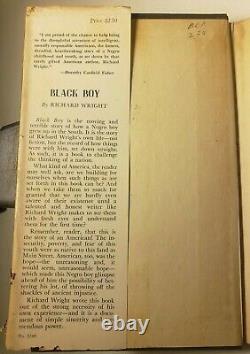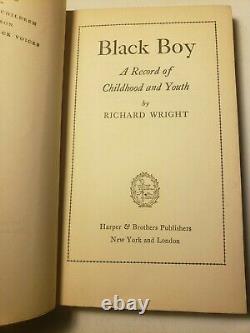1945'BLACK BOY' by RICHARD WRIGHT 1ST ED DJ AFRICAN AMERICAN BIOGRAPHY RACISM







"BLACK BOY - A Record of Childhood and Youth". (5.25 x 8.25). Blue cloth with red embossed lettering. About average jacket wear as shown.
Black Boy (1945) is a memoir by American author Richard Wright, detailing his upbringing. Wright describes his youth in the South: Mississippi, Arkansas and Tennessee, and his eventual move to Chicago, where he establishes his writing career and becomes involved with the Communist Party. Black Boy gained high acclaim in the United States because of Wright's honest and profound depiction of racism in America.
While the book gained significant recognition, much of the reception throughout and after the publication process was highly controversial. Richard Wright's Black Boy was written in 1943 and published 2 years later (1945) in the early years of his career. Wright wrote Black Boy as a response to the experiences he had growing up.
Given that Black Boy is partially autobiographical, many of the anecdotes stem from real experiences throughout Wright's childhood. Richard Wright's family spent much of their life in deep poverty, enduring hunger and illness moving around the country in search of a better life. Wright cites his family and childhood environment as the primary influence in his writing.
Specifically, Wright's family's religious presence throughout his childhood held a strong influence in both his religious outlook and his writing. Similarly, Wright's experiences growing up in poverty enduring hunger caused considerable distress that he referenced repeatedly in Black Boy. Most generally, Wright credits his influence of Black Boy back to the racial inequalities he sustained throughout his travels in America. Wright learned the power of reading and writing as a means towards "new ways of looking and seeing" at a young age. When he was seventeen, he left Jackson to find work in Memphis where he became heavily involved in literary groups and publications and expanded on his use of words as the weapon "to tell, to march, to fight, to create a sense of hunger for the life that gnaws in us" that is seen in Black Boy.
Wright claims that he chose to write about the experiences referenced in Black Boy in an effort to look squarely at his life, to build a bridge of words between him and the world.

